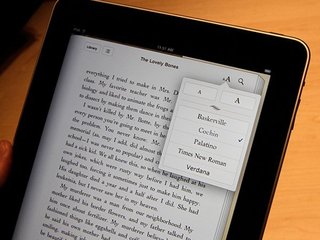
Judge says Apple definitely fixed e-book prices
Despite tons and tons of evidence showing exactly how it fixed prices, Apple still denies it

It’s Wednesday! Which means Apple has won or lost another court battle somewhere in the galaxy. Today, it’s the e-book price fixing battle. A federal judge ruled Wednesday that Apple did indeed conspire with five major publishers to raise the prices of e-books.
“The Plaintiffs have shown that the Publisher Defendants conspired with each other to eliminate retail price competition in order to raise e-book prices, and that Apple played a central role in facilitating and executing that conspiracy,” ruled U.S. District Judge Denise Cote of Manhattan. “Without Apple’s orchestration of this conspiracy, it would not have succeeded as it did in the Spring of 2010.”
Apple maintains that it did nothing wrong and points a finger at Amazon as the bad guy.
"Apple did not conspire to fix e-book pricing," Apple spokesman Tom Neumayr said in a statement to Reuters. "When we introduced the iBookstore in 2010, we gave customers more choice, injecting much needed innovation and competition into the market, breaking Amazon's monopolistic grip on the publishing industry. We've done nothing wrong."
The 160-page ruling goes into the entire backstory of the e-book industry and Amazon’s dominant role as essentially the arbiter of acceptable e-book price points. Unhappy with the $9.99 price point that Amazon had set across the board for ALL e-books, regardless of the amount of effort put into creating them, five of the major publishers (Hachette, HarperCollins, Macmillan, Penguin, and Simon & Schuster) colluded to put pressure on Amazon to raise the price by at least one or two dollars.
At one point, publishers sold certain e-books to Amazon at hardback prices and Amazon just turned around and sold them at the same $9.99 price anyway, absorbing the loss.
Apple’s iBookstore became the saving grace, as it gave publishers a viable e-book distribution alternative to the Kindle store. The ruling details how Apple SVP Eddy Cue made frequent trips back and forth between Cupertino and New York to work things out with the publishers, and how during one nine-day stint, Cue himself said that if he wasn’t eating or sleeping, he was negotiating.
Apple and heads of the five publishers regularly sat down to private dinners together to come up with a strategy to address “Amazon’s bullying behavior” and curtail “their plans for world domination.”
Hachette began deliberately delaying the release of e-books. Even Stephen King gave his “full support” to Hachette’s decision to delay the e-book version of his most recent book until after the hardback had begun selling. HarperCollins followed suit with the e-book version of Sarah Palin’s Going Rogue.
Apple and the publishers agreed to adopt an agency model. Once Apple’s iBookstore became a reality, the publishers began withholding books from Amazon unless the e-commerce giant agreed to a higher price point. Faced with the possibility of losing whole catalogs of books from its Kindle Store, Amazon was forced to switch over to the agency model and start selling certain e-books at $12.99 or $14.99.
Despite all of the evidence, Apple maintains that it didn't do any kind of price fixing and that Eddy Cue was never in New York long enough to organize a conspiracy of that level. If Apple had conspired with publishers to fix prices, the company said, it would have to have been a "conspiracy of telepathy."
Neither Apple nor Amazon could be reached for comment.
Related News


Google and Amazon VS The E-Book Publishers

Why are publishers fighting Amazon's e-books?

